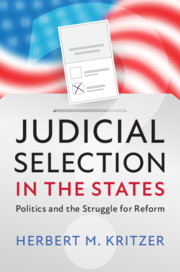Book contents
- Judicial Selection in the States
- Judicial Selection in the States
- Copyright page
- Dedication
- Contents
- Figures
- Tables
- Preface
- Table of Cases
- 1 Introduction
- Part I Change as an Exercise in Partisan Politics
- Part II Change as Court Modernization or Good Government
- Part III Unsuccessful Change Efforts
- 11 Florida and South Dakota
- 12 Nevada and Ohio
- 13 Minnesota, Pennsylvania, Texas, and New Hampshire
- 14 Missouri, Kansas, and Oklahoma
- 15 Conclusion
- Index
14 - Missouri, Kansas, and Oklahoma
Unsuccessful Efforts to End “Merit” Nominating Commissions
from Part III - Unsuccessful Change Efforts
Published online by Cambridge University Press: 06 April 2020
- Judicial Selection in the States
- Judicial Selection in the States
- Copyright page
- Dedication
- Contents
- Figures
- Tables
- Preface
- Table of Cases
- 1 Introduction
- Part I Change as an Exercise in Partisan Politics
- Part II Change as Court Modernization or Good Government
- Part III Unsuccessful Change Efforts
- 11 Florida and South Dakota
- 12 Nevada and Ohio
- 13 Minnesota, Pennsylvania, Texas, and New Hampshire
- 14 Missouri, Kansas, and Oklahoma
- 15 Conclusion
- Index
Summary
The common thread in Missouri, Kansas, and Oklahoma is the effort by conservatives, both in the legislature and outside, to end the role of nominating commissions in judicial selection. This effort was prompted in each state by decisions made by the state's supreme court, when the majority of justices were selected by Democratic governors. It also reflects the broader view among conservatives, demonstrated by what happened in Tennessee where the nominating commission was abolished, that the dominance of lawyers on the nominating commission tends to produce liberal judges. In these three states, with the exception of one court, eliminating the nominating commission requires a constitutional amendment. The one exception is the intermediate Kansas Court of Appeals because it is a creation of legislature, which allows the legislature to set the method of selection and retention; in 2014, the Kansas legislature abolished the nominating commission for that court. The Republican-controlled legislatures in these three states have not succeeded in getting the needed majorities, or supermajorities, required to send a constitutional amendment to the voters.
Keywords
- Type
- Chapter
- Information
- Judicial Selection in the StatesPolitics and the Struggle for Reform, pp. 318 - 343Publisher: Cambridge University PressPrint publication year: 2020



